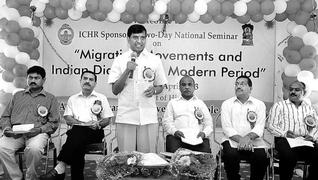A discernible Telugu foot-print now being seen in across the world is a continuation the trend witnessed since 2nd century B.C. when sea-faring people looked for greener pastures in Southeast Asian countries, says Adapa Satyanarayana, Chair, Diaspora studies, Goa University.
Inaugurating a two-day national seminar on “Migration movements and Indian Diaspora in Modern period” at the Acharya Nagarjuna University Ongole campus on Wednesday, he said “Telugu people by nature are most mobile. Knowledge workers from Andhra Pradesh have now become part of the international community, making their presence felt among Asian Indians in the United States among other countries”.

“After brain drain, now the country is witnessing “brain gain” with a number of Telugu associations abroad sending millions of dollars for community oriented development projects such as education, public health, giving a new meaning to global-local interface in the era of expanding Globalisation.
If late 19th century, world capitalism facilitated migration of south Indian labour to the Southeast Asian countries, the late 20th century globalisation provided immense opportunities for unskilled labourers in West Asia in the wake of oil boom.
Historically, relations between the Andhra coast and Burma (Swarnabhoomi), go back to a couple of centuries before the birth of Christ. The sea-faring Telugus immigrated to various countries in Southeast Asia even during the age of the early Kalingas and Ikshavakus.
During the colonial period emigration to Burma was an “established custom” and “a lucrative occupation”, particularly for the lower caste persons of the northern coastal Andhra districts. “Kulim region in West Malaysia was known as “little Anakapalli”, he added.
Delivering the keynote address, Ratan Lal Hangloo, , Department of History, University of Hyderabad, said the Indian diaspora preserved and protected the Indian culture generation and after generation despite great difficulties.
Presiding, ANU Rector Y.P.Rama Subbaiah and
ANU Ongole campus Special Officer G. Raja Mohan Rao spoke.
source: http://www.thehindu.com / The Hindu / Home> National> Andhra Pradesh / by Staff Reporter / Ongole, April 04th, 2013